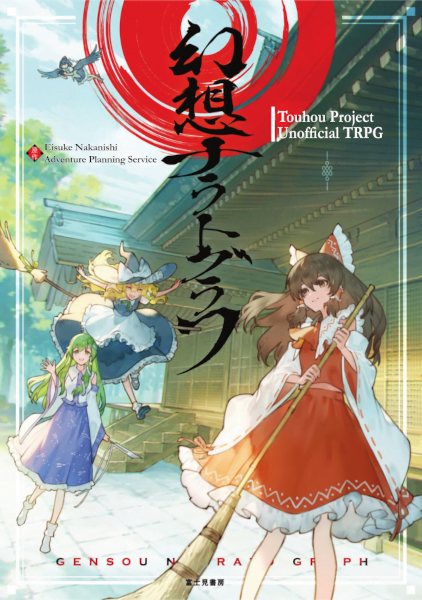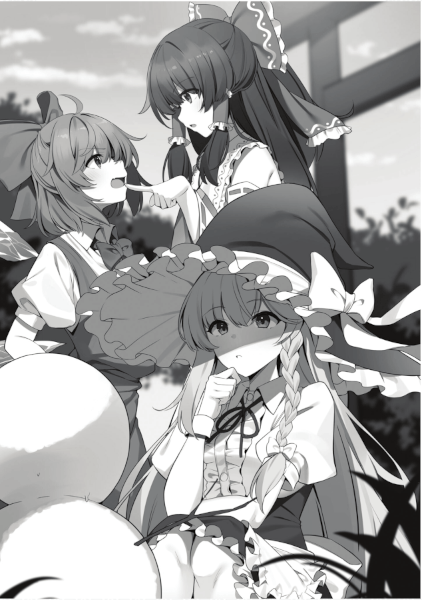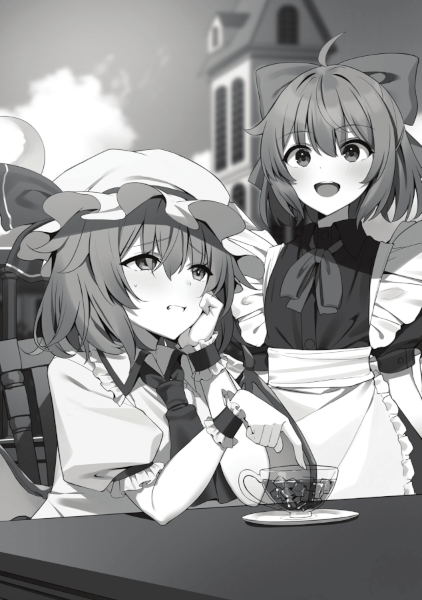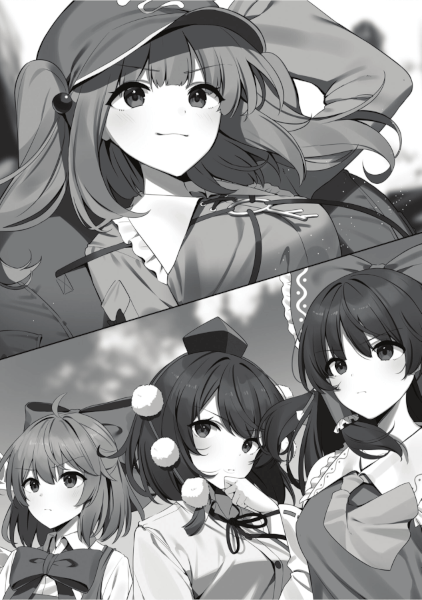I’ve spoken in the past about the sprawling storytelling tradition of the Touhou Project. If you’re unfamiliar, the way I consider Touhou is not a series of videogames or even a franchise as you might conventionally interpret it, but rather a sort of communally shared storytelling space created by a large body of uncapitalised creative sources. Despite the fact that Touhou is the product of, initially, the work of one person (working in concert with an audience and then a community), it isn’t really reasonable to call it a franchise or even a universe. Those things imply a structure, a sort of coherence or an overarching ownership, and that’s something that Touhou absolutely does not have.
What Touhou has is a community and that community connect with other members of their community in almost any communication media you can find. It’s games, sure but it’s also doujinshi, fanfiction, fan art and in pretty much every single place people can create stuff, you’re going to see people creating something Touhou adjacent. In this way, Touhou stretches from a source point out and into pretty much every single other place people can be. I don’t have any proof but I’m confident that someone on the Antarctic Research Station of some country or another had a Marisa sticker inside their backpack or whatever.
Touhou is a lot of things, which is to say, I better watch my mouth. What I think I can say, pretty unreservedly, is that Touhou is distinct. Touhou material does not tend to look like or present itself as anything but Touhou. There are other materials full of girls who look like they’re twelve and wear numerous petticoats and ostentatious hats, but most of them succeed at looking like Touhou and not so much like their own thing distinct from Touhou.
What Touhou makes tends to be made for an audience of Touhou fans, which is why some of the games have a reputation of being brutally, comically hard. There’s a sort of deliberate alienation at work: Don’t you dare ask Touhou to change for you, you need to change for Touhou! Yeah the game is unfair and hard and you can’t get the good ending if you can’t skate through these bullets right, that’s how we like it! That’s how you know you’re a real fan!
(This is not really how they talk)
(most of the time)
(Since they left 4chan)
Anyway it’s this pre-existing weirdoscape that gave rise to what is, to my eye, simply the strangest goddamn Tabletop Roleplaying game I’ve ever seen.
Content Warning: I’m not really a Touhou fan and this game doesn’t change my opinion of it. If you’re heavily invested in this game being a good game and want to see me praise it, you won’t, so it’s probably best to just jog on.
Just a note: I’m reading an unofficial translation of Gensou Narratograph. I’m not fluent in Japanese, and any time I think a phrase is badly written or clunky or strange, I let it go. That’s not important to this and treating the game as if that’s vital is a great way to cut yourself out of a lot of really cool translated TTRPGs.
If you’ve been paying attention to me talking about Tabletop RPGs for any length of time, you might find that because I don’t get to play them very often I usually look at them in terms of their approach, their interface, and their offerings. Oo, what fancy words. What do they mean?
- The approach of a game is how it induces you to play it. What’s the introduction to the book like, when does it start you playing it?
- The interface of a game is how it plays. What does the game let you dick around with? What are the systems in the game space that you can play around with and that you can express using the game’s systems and how does the game’s systems make them work? Simplified, what does the game give you as a button and what happens when you push it? This includes things like if the book is well-written, how you handle it, and if it looks nice.
- The offerings of a game is the promise of the fantasy you get to indulge if you play it! Whether it’s becoming an adventurer engaged in tactical combat or a spacefaring captain doing deals for rare goods, the offering of a game is how all the other stuff makes space for you to enjoy this thing.
I think, fundamentally, that the more I read and reread this book, every single part of Gensou Narratograph is extremely, extremely bad. Or rather, completely unsuited to my experiences of what I want in a tabletop RPG. It’s one thing to call the approach bad, but is it bad if the approach is explicitly trying to get a mere normie like me to go away? Is that not the point?
But I’m getting ahead of myself. Also behind myself. Because in terms of approach, this game starts not with an introduction to the universe, nor an invitation to fantasy or even character creation, but instead with a page describing the ‘correct’ way to read this book. The first thing the book says to do, the way you should start with this game, is not to look at mechanics or character options or anything like that, but to instead read a recap of a play session of the game, with Zun. Zun is the creator of Touhou. Zun is, in a way, just some guy.
This recap is a hundred and ten pages long.
It is a hundred and ten pages long.
This game does not start you with character creation, but instead an actual play script with someone famous, and you should want to read it because that person is cool and famous and important. I read some of it. I tried. I also didn’t have any meaningful context for the actual play because to me, understanding how the game works is important to knowing what’s going on when they make gameplay decisions. But okay, after that, we get to the introduction, which begins with a pitch for its fantasy about being resolution experts who use spellcards to unleash a beautiful hell of bullets. Great! This is the stuff I expect I’m supposed to be seeing in a game like this, so far so good. Then we get a description of what a tabletop roleplaying game is, a description of the gamemaster and players, and then a description of what you’ll be playing.
Let’s put a pin in that point though.
Then we get a list of requirements – rulebook, players, place to play, d6s, writing tools, types of sheet, tokens, and a nice reminder to take breaks. Then there’s a list of nice-but-not-necessary things to include like snacks, music, time and place for post-game talk, some resistance to bullets, and people to play with, which gets mentioned twice as both necessary and not necessary. I personally would file players under ‘essential’ rather than ‘nice to have.’ Then we get some glossary and it’s blessedly short – this whole introduction is only five pages long! – before the book introduces characters.
Now, in my preference of an approach, I think that you should give people the pitch of the offering – here’s the fantasy! – then the basics – here’s what a d6 is! – and then the fundamental mechanics of the game, like the d20 resolution system, where big numbers are better – and then move on to character creation. Which means that while I feel like I’m missing something, once you get past that 110 page introduction, then this approach is more or less doing what I expect to do in a book with what I consider a good approach.
But we’re going to put a pin here to jump ahead a chapter to talk about the rules, the things that make up the interface.
The rules system is built around checks; you roll n dice to aim for a target number of y, formatted as ‘nd:y’, and that works fine as a formatting choice. This is not an additive kind of dice roll, though, but a dice pool. So if you roll 2d6 aiming for a target of 4, and you get a 3 and a 3, you didn’t succeed at the check. It’s a simple binary system too – either you rolled the target or higher, and you succeed, or you rolled below it, and you failed. You have triumphs and fumbles, representing very good success and very big failures, and, shout out to thy dungeongal, it has even got a failure table for fumbles. It’s not a Rolemaster fumble table, but it’s pretty good for a small affair in a simpler game.
There’s something like an initiative system for most of the story – a ‘yet to act’ and ‘acted’ system, which means that once you do something significant, you have to wait until everyone else has a turn. I don’t mind this, this is a system that formalises something I know a lot of people already do in their game situations. Some players don’t like this? I know a few who would rather be quiet and let the story happen without being regularly called upon to check if they’re okay.
From there, there’s mechanics about a multi-phase story, following a pattern; you have an investigation phase with quests you should fulfill, and the quests serve as flags for getting to the next part of the story, in the next phase. Clues are distributed randomly by dice on a pre-established map, and then there’s a time limit to work out how long you have left to fulfill the investigation phase of the story. There’s random daily events that represent the ongoing life in Gensokyo, a recovery stage of the day, and players even move around the map of the world based on rolling dice according to their motivation stat.
You know, like a roll-and-move board game.
Players are atomised in this part of the game. They don’t move as one but instead everyone is moving and investigating in their own time. If you wind up in the same square as a player you can build a bond with them and do your thing with them, which is useful for assisting later on. Failing to uncover a clue in a location leads to more clues being propogated, meaning that over time the play space fills with clues and failures still bring opportunities.
The combat system – called Danmaku Combat – is heads-up, one PC vs one NPC. Characters have unique boards for combat, known as their Danmaku Fields. From here the rules get complicated, and I use that word in place of the word complex. You roll to determine attacks. Your die rolls represent how many bullets you place around your enemy, but also where. You don’t get to control that. You can use spellcards, and then you can roll to dodge, and finally the game calculates hits. Then there’s a set of qualifiers to check how the resolution of that round works, bullets are tidied up, and the combatants reset to a new initiative.
After that, there’s a denoument which also suggests that you should share the story of your game on social media.
I will say about this system I appreciate some simplicity. If you’re in the same square as a bullet, you get hit. That’s just how bullets work. There’s even a mechanic for grazing! I like some of the board-gamey mechanics and I think the idea of flying characters bringing their own ‘board’ to represent how they influence the space around them in battle is pretty novel!
I do not like any of the other mechanics.
No not even that one.
I’m trying to be kind. I’m trying to be kind, I’m trying so hard. I’m trying to approach this as if it’s just extremely alien, as if it’s categorically different to what I want in games and therefore every single thing I dislike is fine because cheese and apples, oranges and pears, some people just like different things, it’s fine, it’s fine, and hey, maybe even I’m being a bit of a western chauvinist expecting this game book to be built the way I think a game book should be.
Except hang on, no I’m not, I’m talking about this strictly as a matter of preference. And we’re not even at the thing I find the most repellent about this game.
See, when I described above ‘characters,’ you might notice I didn’t use the term ‘creation.’ I called the section ‘characters,’ because you don’t get to create characters. Characters are pre-generated. This game comes with thirty writeups of established, pre-defined, pre-characterised Touhou girls, and you get to get to pick one of twenty-one character traits about them that can, based on the dice, be entirely equally distributed across all thirty of these characters.
This is fantastically strange to me.
This is actively player hostile to me.
And it’s not like this breaks with the trend of how people care about Touhou: I don’t know anyone with a Touhou OC, but I know a lot of people who refer to old friends, friends they had in younger days, as ‘a Marisa’ or ‘a Reimu.’ I know more Touhou fictives than I know people who create new things in the Touhou space. If you’re a Touhou fan, you’re probably a fan of these characters, and I guess if that’s all you’re a fan of, you wouldn’t be bothered by the lack of a creative toolkit for existing within this world.
This is a vision of tabletop RPGs that does not exist to me outside of the most fishknived deliberate designs like Everyone Is John. This game’s vision of its setting and its characters are not that this is a place you want to play in but that this is a pre-existing cast of characters you want to embody and play. You don’t make a Touhou OC (A TouhouC) in this game and get to play them meeting important NPCs, you pick up a pre-established Touhou, with her established interests and behaviours, and try to play her as close to your vision of her as you can. And I say her, because they are all women, and…
Lords.
I know there’s a queer angle on all this but I am too aware of the audience that likes Touhou for the Wrong Reasons, because, again, I know where a lot of the English-speaking fandom came from.
If I was going to be so gauche as to talk about Gensou Narratograph as if it were a mere game that I was going to have an opinion on I’d say it looks like it sucks. But that’s just my opinion based on merely reading the entire book and not being already a fan of Touhou, a shorthanding of a number of critical considerations of the qualities and choices made in this game, summed up in a short form to express my ideas clearly. It’s not that it’s a bad game, it doesn’t make people ill or commit tax fraud or anything. Chances are good, if you’re a fan of Touhou, you’re probably going to love the idea of a game that hands you a character sheet at the start and says congratulations, you’re Suwaku Moriya now! Look at your funny froggy hat! You have a skill called Creating Kun (Earth)!
It is, in the truest sense, the most Touhou TTRPG that could exist, in that it seems completely impenetrable to me, offering no reason to engage with it outside of pre-existing love and veneration for the property, and happy to be that way.



